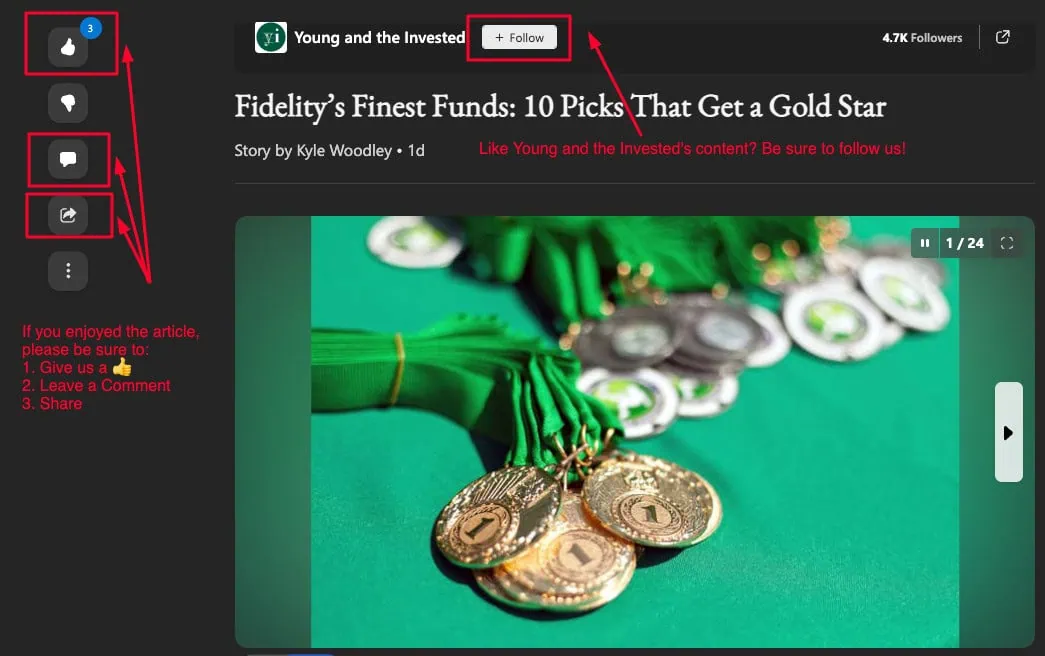A few years ago, one of our earliest editions of our newsletter The Weekend Tea discussed the “Great Wealth Transfer”—a decades-long passing-on of cash, stocks, real estate properties, and other assets from Baby Boomers (born between 1946 and 1964) to Gen X, Millennials, Gen Z, and Gen Alpha.
Specifically, at the time, projections were for an $84.4 trillion transfer of assets through 2045, “with the vast majority ($72.6 trillion) being passed along to heirs.”
That figure has ballooned since then, to $124 trillion passing down to children and grandchildren over the next 25 years, according to more recent projections from wealth management firm Cerulli Associates.
Those are numbers that would make most financial advisors’ mouths water … if only so many inheritors didn’t appear poised to give their parents’ advisors the boot.
Featured Financial Products
Poll: America Could See a Great Advisor Transfer, Too

“America’s Great Wealth Transfer,” a new report from the Harris Poll, examines this phenomenon’s “far-reaching impact on older Americans, their heirs, and each generation’s distinct perceptions of wealth management.” It explores how wealth management and client relationships are evolving, and it also uncovers what will-be heirs are looking for from financial advisors.
Older Americans (ages 55+) with at least $1 million in total investable assets were asked about their plans for wealth distribution. And younger Americans (ages 18-54) who expect an inheritance of at least $500,000 shared expectations around inheriting assets from parents or grandparents.
The most central finding?
“Gen Zers and Millennials will not continue the family/advisor relationship, simply out of loyalty or even if a huge inheritance was attained,” says Jennifer Musil, President of Research at The Harris Poll. “For younger heirs, even when satisfied with their parents’ financial providers, 43% still plan to end that relationship and find their own advisor.“
Two of the poll’s other findings begin to paint a picture of why that is.
- Younger generations are more likely to prioritize ESG [environmental, social, and governance] and impact investing, signaling a shift in portfolio strategy and firm alignment.
- Communication preferences are changing. Most heirs want multiple advisor touchpoints each month, blending digital convenience with human guidance.
While it appears to be a potential crisis for the financial advisory industry—or at least for established advisors who stand to lose that business—reality might lie somewhere in between.
There are several ways in which advisors might not be meeting clients where they are … but also, some of these shortcomings might just be in perception only, and better communications could go a long way in painting a more accurate picture.
Why Do Inheritors Want to Seek Out New Advisors?
Over the past week, we’ve talked to several experts about this seeming gulf of disconnect between younger generations on the verge of inheriting substantial wealth and their would-be (but maybe-won’t-be) financial advisors.
So, why are younger Americans seemingly so eager to hit the exits?
Harris Poll notes a number of reasons—including “mismatched values, investment philosophies, or communication styles”—that we’ll plumb more deeply. There’s also a stark difference in the nature of professional relationships, starting in the workplace; Americans from older generations are more likely to have spent their whole life with one job, one advisor, one tax planner. Younger Americans, however, have experienced far more volatility in these areas.
“My father, for example, worked for one single bank for a long time,” says Tom Fields, founder and CEO of Fynancial, a mobile-first platform helping RIAs modernize client engagement. “Now flip it over before I started Fynancial. Before I was a financial advisor, I actually worked at three different banks. So I think there’s a radical change in the 30-year-old vs. the Baby Boomer of, let’s say, commitment and not being immediately glued to the first person you enter a relationship with.”
But it also might be a matter of attention.
Adam Grealish, head of investments at Altruist, a provider of technology and tools for financial advisors, says the question speaks to how much of a relationship an advisor has with inheritors.
“Think about [these questions]: How many touchpoints do you have with the prospect before they become your client, how many touchpoints do you have with the client once they are a client, and then how many touchpoints do you have with an inheritor?” he says. “If [the last one is] a number less than any of those two previous numbers, it should not be surprising that the first thought for the inheritors is just finding someone else.”
Featured Financial Products
Touchpoints
A shortfall in touchpoints could be especially problematic given one of the biggest differences between generations:
Most young Americans do or want to consult with their financial advisor at least several times a month or more, while only 7% of older Americans do the same in their current relationships.
It’s easy to immediately view that through the lens of sheer preference. But Melissa Schweizer, Vice President of Strategy and Go To Market at The Harris Poll, says that we should think about the contrasting positions these generations are in.
Young and the Invested Tip: Not sure whether you need a financial advisor? Ask yourself these questions, and the answers will be your guide.
“If you think of the older generation, they might not need as many touchpoints because they’re established with their advisor right now,” she says. “I would say probably once, maybe two to three times a year they meet with them, go over their goals and priorities, and their financial advisor already understands that.
But both the wealth and advisor are usually new to the younger generation. “They inherit this wealth, and they make this other money, and they want to … meet several times a month and establish that relationship with their financial advisor. That’s why they might want to meet more [than older Americans].”
There’s also the matter of what those touchpoints are.
Make Young and the Invested your preferred news source on Google
Simply click and select the ✓ box for Young and the Invested. Once you’ve made this update, you’ll see Young and the Invested show up more often in Google’s “Top Stories” feed, as well as in a dedicated “From Your Sources” section on Google’s search results page.
Digital Communications Are Key
The Harris Poll asked both younger and older Americans which statement they agreed with more: “I prioritize convenience and 24/7 access through digital tools” or “I prioritize building trust and a long-term relationship with an advisor.”
While both generations favored building trust and relationships, the minority of people who prioritized convenience and 24/7 access was much larger in the younger group, at 41% vs. the older group’s 26%.
It’s a helpful reminder that, depending on your age, “touchpoint” might be different. Older generations’ contact with financial advisors historically came through in-person meetings and phone calls, with email claiming a role in more recent years. But younger generations are much more likely to consult not just through traditional means and even email, but texts and even via advisor apps and web portals.
“Younger generations are either fully digitally native or mostly digitally native,” Grealish says. “They’re not going to expect to consume information about their portfolio investments through monthly statements mailed to them, or emailed to them. Folks are going to expect to be able to have 24/7 access through a thoughtfully designed digital platform, to have digital-first interactions.”
Not that digital should be the only touchpoint for younger Americans, who broadly favor some level of verbal communications, and almost half of whom still want some form of face-to-face meeting, between in-person (29%) and virtual (20%).
That digital aspect to wealth advising seems to start and end at communications, however.
According to The Harris Poll, older (89%) and younger generations (66%) alike agree that they trust human advisors and their judgment to make the best decisions for their finances over automated systems and algorithms. “This underscores the need for financial advisors to provide personalized, human-centered guidance rather than relying exclusively on digital-first strategies,” the report says.
Do you want to get serious about saving and planning for retirement? Sign up for Retire With Riley, Young and the Invested’s free retirement planning newsletter.
Values
When asked about the various reasons they would switch asset managers, 25% of younger Americans listed communications as an issue.
That wasn’t the biggest problem, however. Here’s a look at the three top reasons given:
- “We do not have a similar investing philosophy”: 38%
- “My values do not align with those of the current provider”: 26%
- “I do not trust them to make the best decisions for my assets”: 26%
(Note: Respondents could choose more than one reason.)
“The younger generation is looking for that personal fulfillment, and they are looking to make sure that they are using ESG and impact investing to make sure that their investments make a difference,” Schweizer says.
Indeed, while both generations’ top priority for their investments is financial returns, younger Americans “place greater emphasis on the social consequences of investing, such as impact investing (28% younger, 3% older), and ESG (13%, 2% respectively).”
Communication Goes Both Ways
But those reasons also indicate that communication could be a bigger issue than simply the means by which a client can get in touch.
“I think if there’s a survey going on and an inheritor is worried about values, to me, they’re flashing a red light that clearly the inheritor has just not met the advisor,” Fields says. “Because if you have, you wouldn’t be wondering—you should know where they stand on values. That decision should be made.
“A financial advisor is a service-based business, and the best service-based businesses aren’t afraid to … they don’t just say yes and nod their head and go along. If the inheritor comes in and wants ESG or tobacco or guns, whatever it might be, the advisor won’t stop there. They’ll peel back the onion a little bit to find the reason.”
Young and the Invested Tip: What tools and strategies should you put to use in your retirement investing portfolio? Here’s a look at the basics.
Adds Grealish: “Most advisors are very interested in listening to what the client’s goals are, what they care about, and marrying that with a plan that you know that makes sense, and applying their expertise as an advisor to do it in the most thoughtful and prudent way.”
Grealish agrees that many disconnects might be from a lack of touchpoints.
“Are they happening at all? Because if not, then in certain cases, the current advisors might be a little bit in the hole,” he says. “‘Oh, that’s my parent’s advisor. They did things kind of old school, this doesn’t really align with how I do things.’ And I think [would-be inheritors] would probably be surprised if they had more touchpoints; a lot of those views would probably change.”
If you’re a would-be inheritor wondering if you should bail from your family’s current advisor or stick around, asking basic questions can help determine for sure whether your values and financial interests will be best represented.
Among questions Grealish suggests asking include:
- How do you make money?
- What is your investing philosophy?
- How do you think about financial planning?
- How are my goals and plans aligned?
- How do you think about managing taxes?
- How do you think about managing cash flows?
- How do you think about planning for important life events?
- Are you a fiduciary? (A fiduciary is a person or group that has a legal and ethical duty to act in the client’s best interests.)
The answers to these questions should provide a strong basis for evaluating any financial advisor, current or future.
Want to talk more about your financial goals or concerns? Our services include comprehensive financial planning, investment management, estate planning, taxes, and more! Schedule a call with Riley to discuss what you need, and what we can do for you.
Please Don’t Forget to Like, Follow and Comment

Did you find this article helpful? We’d love to hear your thoughts! Leave a comment with the box on the left-hand side of the screen and share your thoughts.
Also, do you want to stay up-to-date on our latest content?
1. Follow us by clicking the [+ Follow] button above,
2. Subscribe to Retire With Riley, our free weekly retirement planning newsletter, and
3. Give the article a Thumbs Up on the top-left side of the screen.
4. And lastly, if you think this information would benefit your friends and family, don’t hesitate to share it with them!





